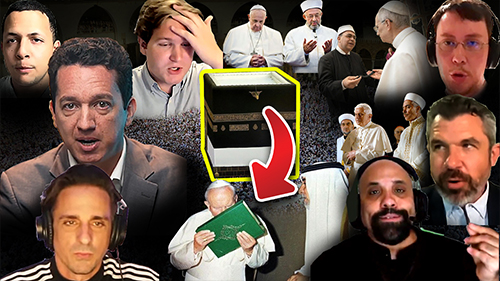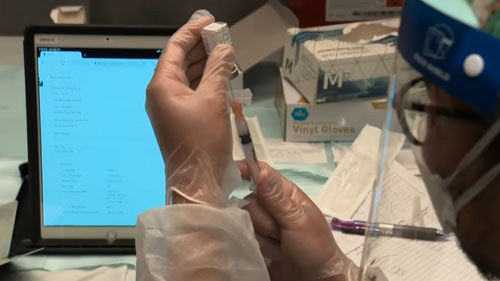| Recent Featured Videos and Articles | Eastern “Orthodoxy” Refuted | How To Avoid Sin | The Antichrist Identified! | What Fake Christians Get Wrong About Ephesians | Why So Many Can't Believe | “Magicians” Prove A Spiritual World Exists | Amazing Evidence For God | News Links |
| Vatican II “Catholic” Church Exposed | Steps To Convert | Outside The Church There Is No Salvation | E-Exchanges | The Holy Rosary | Padre Pio | Traditional Catholic Issues And Groups | Help Save Souls: Donate |  |









 " />
" /> " />
" /> " />
" /> " />
" /> " />
" />




The Bible teaches Confession to a priest
The Bible teaches Confession to a priest [23 min. audio] A sincere person cannot deny the facts.
John 20:22-23- “[Jesus said to them]: Receive ye the Holy Ghost: Whose sins you shall forgive, they are forgiven them; and whose sins you shall retain, they are retained.”
Many non-Catholics think that confession to a priest is not taught in the Bible. According to them, to be forgiven of even serious sins one must simply believe in Jesus; or at the most, confess those sins directly to God. However, this position – that confession to a priest is not necessary for serious (i.e., mortal) sins after baptism – contradicts what is taught in the Bible.
IN THE OLD TESTAMENT, ONE HAD TO GO TO THE PRIEST TO BE FORGIVEN
If one committed a sin in the Old Testament, he couldn’t just confess the sin to God and be done with the matter. No, he had to go to the priest. This is taught throughout the book of Leviticus, one of the first books in the Old Testament. Here’s a good example of this:
In this passage we see that the priest’s role was indispensable for the forgiveness of sin. This is taught throughout the Book of Leviticus and the other foundational books of the Old Testament. Here’s another example:
ONE HAD TO GO TO THE PRIEST TO BECOME CLEAN
Not only did one have to go to the priest to be forgiven of sins (as these and other passages make clear), but also to become clean. In the Old Testament, people would become unclean after having done certain things which God said made a person unclean. To become clean, the priest would have to be involved. Jesus makes reference to this in Luke 5:13-14.
GOD HAD PRIESTS; GOD HAD A PRIESTHOOD; GOD RECONCILED PEOPLE THROUGH PRIESTS
Now, some might say: that was the Old Testament. What about in the New Testament, after Jesus has come? We will see that the New Testament teaches confession to a priest. But these points from the Old Testament are important to consider first because they demonstrate how God works and how He has worked throughout salvation history. God had priests; God set up a priesthood; God forgives and reconciles people through priests. People had to go to the priests to be forgiven.
In Numbers 3, we see a reference to a distinct line of priests, who alone are to handle this special ministry.
Numbers 3:3 also says that priests’ hands were consecrated; but that has been removed from the Protestant Bible.
In Deuteronomy 17:9 and 24:8, we read about the necessity to follow the instructions of the priests. In Deuteronomy 26:1-5, we read about offering the first-fruits to the priest.
NUMBERS 5 ON THE NECESSITY TO CONFESS SINS
In Numbers 5:6-7, we see that people are to confess sins.
The rest of the chapter contains instructions which involve the priests at every turn. For example:
Thus, in Numbers chapter 5, we see a clear example of confession, as well as the intercession of priests. In Numbers 6:11, the very next chapter, we see that if a man becomes defiled by a certain action “the priest shall offer the one for a sin offering, and the other for a burnt offering, and make an atonement for him...”
SINS ARE FORGIVEN THROUGH THE PRIEST
In Numbers 15, we again see that sins are forgiven through the priest.
This is repeated in Numbers 15:28.
EXODUS AND LEVITICUS TEACH THAT PRIESTS ARE TO WEAR SPECIAL GARMENTS: VESTMENTS
In Exodus 28:1-3, we read about the office of priests, and that the priests wear special garments.
We read the same in Leviticus 16:32.
LEVITICUS TEACHES THAT THERE ARE CERTAIN SPECIAL FEASTS: HOLY DAYS OF OBLIGATION
In Leviticus 23:4, we read about special feast days, or holy days of obligation, which were to be observed.
There is no doubt that God set up a priesthood. God established it so that men were reconciled, forgiven, and made clean through the ministry of priests. That was how God worked in the Old Law. What about in the New?
JESUS CAME NOT TO DESTROY THE LAW, BUT TO FULFILL –
HE INSTITUTED A PRIESTHOOD
Jesus came not to destroy the law and the prophets, but to fulfill. There is no doubt that the New Law surpasses the Old. It surpasses it so much that it makes it obsolete. Jesus accomplished all the figures and prophecies in the Old Law. He made a New and more perfect covenant, rendering the Old thereby void (Hebrews 8:13).
But the New Law has similarities to the Old Law, being its fulfillment. For example, in the Old Testament there were 12 tribes with 12 tribal leaders, and Moses had 70 elders; likewise, in the New Testament, Jesus has 12 apostles and 70 other disciples, as we see in Luke 10. Another example would be how Jesus inherits the throne of David, as we read in Luke 1:32 and Acts 2:30.
Jesus and His spiritual Kingdom (His Church) fulfill what was prefigured in the earthly Kingdom of the Davidic Monarchy.
Another example of how the New Law corresponds to the Old Law would be how, in the Old Testament, a father passed his blessing on to his son through the laying on of hands. In Deuteronomy 34:9, we see that spiritual authority is passed down from Moses to Joshua through the laying on of hands. Likewise, in the New Testament priests are ordained through the laying on of hands, as we read in 2 Timothy 1:6.
So the point is that while Jesus’ Kingdom and New Law surpass and make void the Old, the New Law nevertheless fulfills, perfects and corresponds to the Old in many ways. (It should be pointed out that the forgiveness of sins or justification in the Old Testament was an inferior covering of sin which turned away God’s anger, but did not fully put away sins. The full remission of sins couldn’t happen until the coming of Jesus Christ and the New Law. See Hebrews 10:4.)
Therefore, just as there was definitely a priesthood in the Old Testament, there is a priesthood in the New Testament. The Apostles were made priests and bishops by Jesus Christ.
JESUS GIVES THE APOSTLES THE POWER TO FORGIVE SINS
Jesus gives priests the power to forgive sins. We read this clearly in John chapter 20.
Jesus says that whoever’s sins you forgive, they are forgiven; and whoever’s sins you retain (do not forgive), they are not forgiven. Nothing could be more clear. The Apostles could only determine which sins to forgive and which sins to retain if they heard a confession of sins. This passage proves that Jesus instituted confession to priests.
AS SON OF MAN, JESUS HAD POWER ON EARTH TO FORGIVE SINS
AND HE CAN AND DID TRANSFER THAT POWER TO OTHERS
Even though the meaning of John 20:23 is obvious, there’s another point that must be noted in this regard. In Matthew 9:6-8, we read:
Jesus was both God and man, but notice that this passage emphasizes that He had authority as the Son of man to forgive sins. Since Jesus had authority to forgive sins as the Son of man – as is also made clear in Mt. 28:18, when He says that He has been given all power in Heaven and Earth – then He can transfer that authority to others. Look at John 20:21 again:
Just as Jesus was sent as the Son of man with power on Earth to forgive sins, He sends His Apostles to dispense His forgiveness to others.
ST. PAUL SAYS THAT PRIESTS RECONCILE MEN TO GOD IN CHRIST’S PLACE
That’s why St. Paul, who was made a priest and bishop in the Church, says this:
This passage makes it clear that Jesus sends His Apostles to be the ministers of His reconciliation and forgiveness. That’s why the Church has taught that priests, in hearing confessions, stand in the place of Christ. They are not a barrier to Christ, but an avenue, a conduit of His reconciliation; just as St. Paul says: “we pray you in Christ’s stead, be ye reconciled to God.”
This is the reason that Jesus gives the Apostles the power to forgive and retain sins in John 20:23, right after sending them in John 20:21 (as His Father has sent Him).
Moreover, in the Acts of the Apostles, we read that people came and confessed their deeds.
All of this demonstrates without any doubt that Jesus instituted confession to priests.
JESUS GIVES THE APOSTLES THE POWER TO BIND AND TO LOOSE SINS
Further confirming that the Bible teaches confession to a priest, we see that the Apostles were given the power to bind and to loose in Matthew 18:18.
This has application to the forgiveness of sins, and to the fact that Jesus dispensed His authority to valid bishops and priests in His one true Church. The authority that is exercised by priests and bishops must be used under the unique authority of the Keys, which were given alone to St. Peter in Matthew 16:18-19.
IF WE CONFESS OUR SINS, HE IS FAITHFUL AND JUST TO FORGIVE US OUR SINS
Notice that the passage says “if” we confess our sins, He is faithful and just to forgive us our sins. It doesn’t say that He will forgive our sins whether or not we confess our sins, or as long as we believe.
JAMES 5 TEACHES THE CATHOLIC SACRAMENT OF EXTREME UNCTION
In James 5, we see a reference to confessing sins, priests, and the forgiveness of sins.
This passage is a classic proof for the Catholic sacrament of Extreme Unction. Extreme Unction is the Catholic sacrament received at the time of death; it’s a priestly anointing and rite which, if properly received, strengthens a man in his final illness of life and forgives his sins. In this passage of James 5, we read that you should “confess your faults to one another.” That instruction comes directly after making reference to calling for the elders/priests of the Church. This shows us, once again, the necessity of confession and priests, as well as the link between the two.
These facts demonstrate that the New Testament teaches that confession to a priest is necessary for the forgiveness of serious (i.e., mortal) sins committed after baptism. That’s why the Catholic Church, the one true Church of Christ, has taught this for almost 2000 years.
THE FATHERS OF THE ANCIENT CHURCH TAUGHT CONFESSION
The fathers of the Church also believed in confession and taught that it was necessary. Their testimony confirms that confession is the true teaching of Jesus Christ and the Bible.
In the earliest days of the Church, confessions were sometimes made publicly to the priest or to the bishop in front of others in the congregation, and sometimes they were made privately.
One of the best proofs for confession from the fathers of the Church comes from famous early Church writer Origen, dated approximately 245 A.D.
Origen clearly teaches that confession to the Lord alone is not enough; there must be confession to the priests.
All of this proves that the Bible teaches the necessity of confession to a priest. The Catholic Church has always remained faithful to this teaching of the Bible because the Catholic Church is the one true Church of Christ.
Sign up for our free e-mail list to see future vaticancatholic.com videos and articles.
Recent Content
^